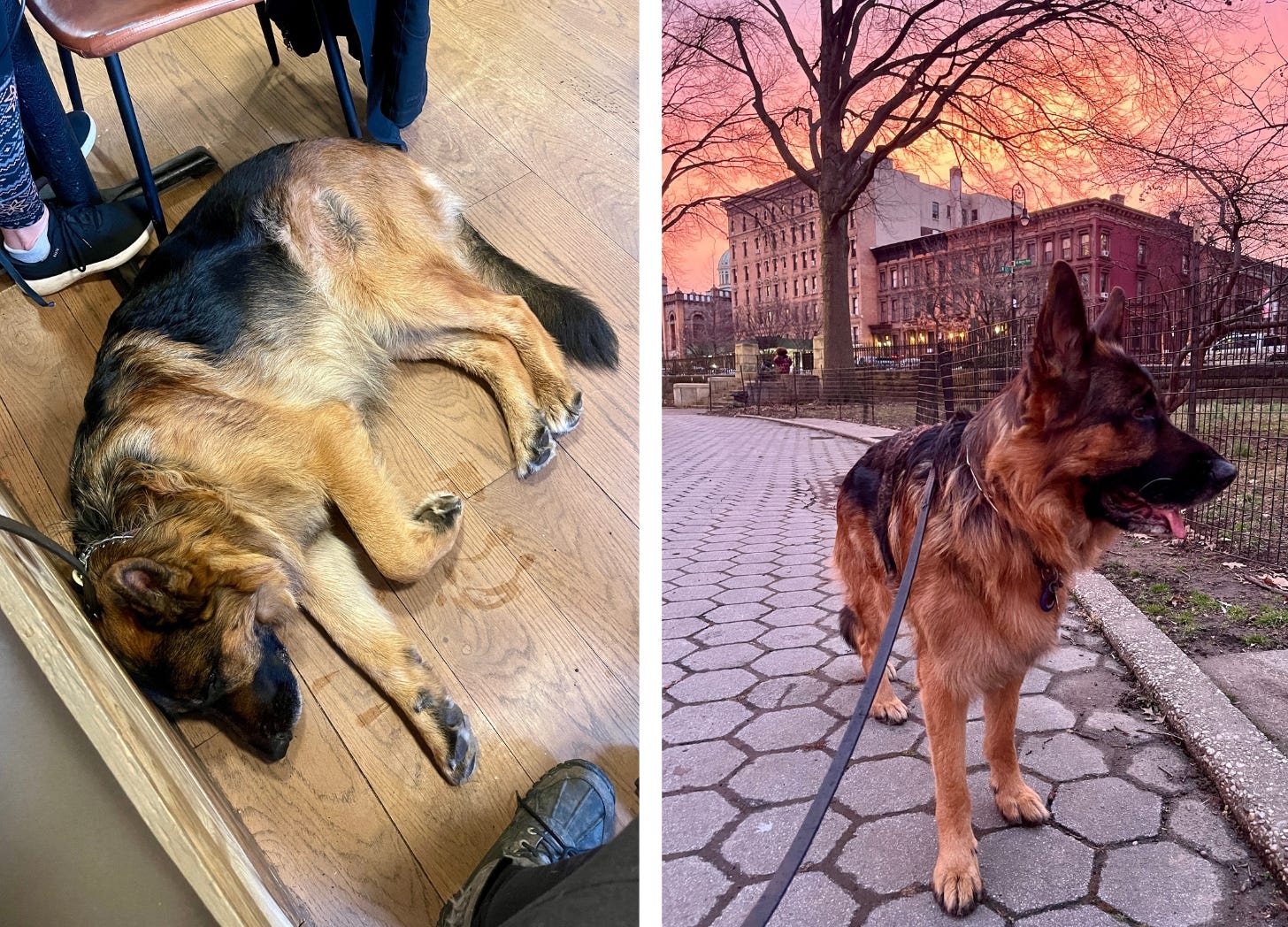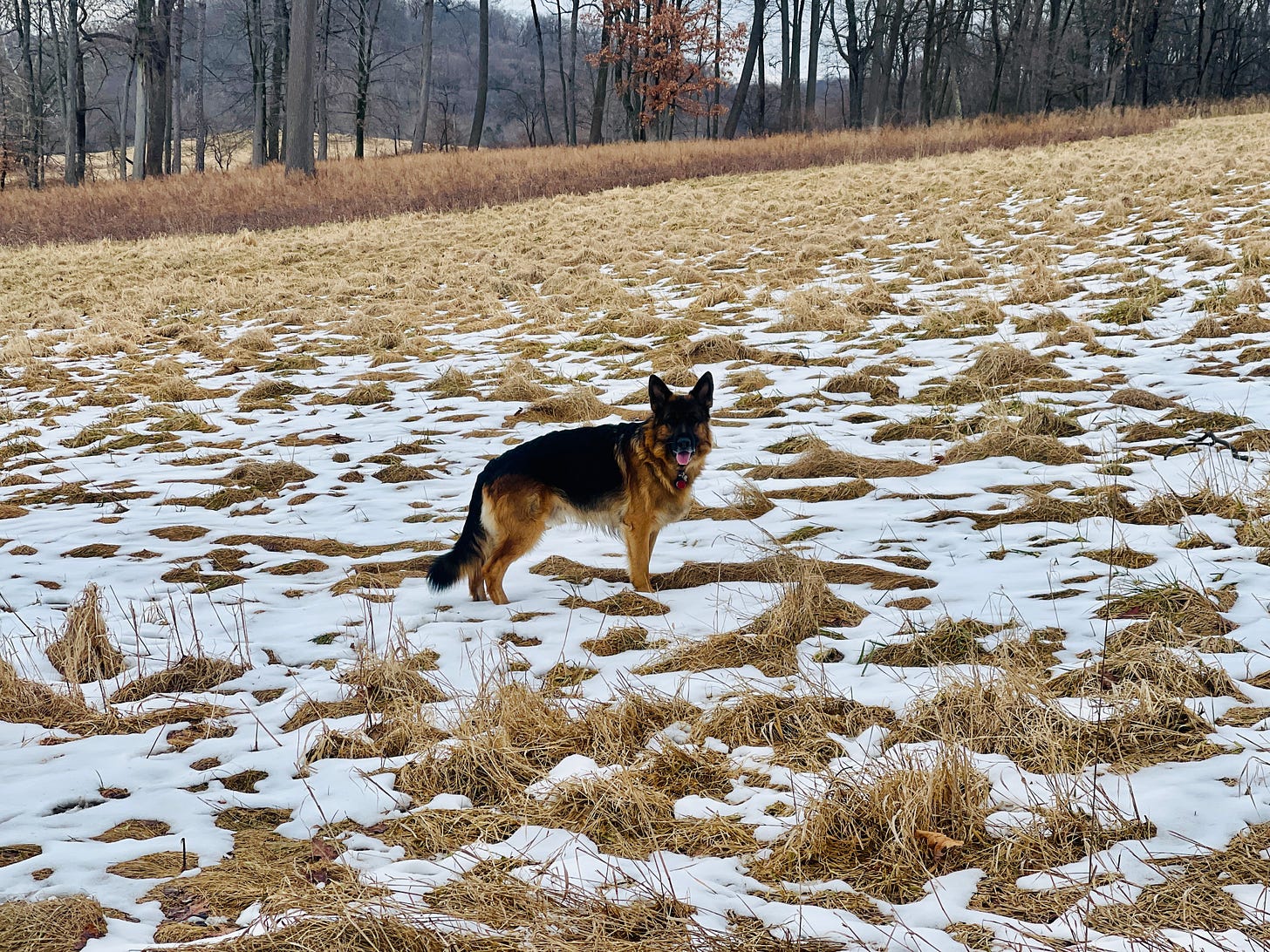🚏 Creative Crossroads After Achieving Success
Sharing "Second Wind" by Václav Havel
Yesterday while a pest control company sprayed our apartment for cockroaches (hallelujah),1 I took Ryder on a rare day trip outside of the city to meet up with my palDavid Spinks for a hike. David is one of my earliest blog friends (circa 2009) and we recently reconnected after a decade of falling out of touch, thanks to Substack.
Our favorite topic of conversation? Comparing notes from The Abyss.2 The liminal space that undergirds so much of what I share here on Doh, entering midlife, swinging between professional trapeze bars, and trying to be discerning as we contemplate what to pour energy into next.3
Just this morning my announcement that I’m pausing both podcasts went live, after nine years and 700+ episodes. It’s a strange feeling, and I can’t bear to listen back just yet. After publishing three episodes a week for the last two years, it’s bizarre not to have any recording sessions on the horizon or a reason to jump on the mic to share what’s on my mind.4
With thanks to SatPost by Trung Phan for surfacing this—and to David for passing it along after our hike—today I bring you an essay on navigating artistic crossroads from Václav Havel, a Czech statesman, author, poet, playwright and dissident.5
Second Wind
By Vaclav Havel from Open Letters: Selected Writings, 1965 - 19906
Sooner or later, however, a writer (or at least a writer of my type) finds himself at a crossroads: he has exhausted his initial experience of the world and the ways of expressing it and he must decide how to proceed from there.
He can, of course, seek ever more brilliant ways of saying the things he has already said; that is, he can essentially repeat himself.
Or he can rest in the position he achieved in his first burst of creativity, subordinate everything he learned to the interests of consolidating that position, and thus assure himself a place on Parnassus.
But he has a third option: he can abandon everything proven, step beyond his initial experience of the world, with which he is by now all too familiar, liberate himself from what binds him to his own tradition, to public expectation and to his own established position, and try for a new and more mature self-definition, one that corresponds to his present and authentic experience of the world.
In short, he can find his “second wind.” Anyone who chooses this route—the only one (if one wishes to go on writing) that genuinely makes sense—will not, as a rule, have an easy time of it. At this stage in his life, a writer is no longer a blank sheet of paper, and some things are hard to part with. His original elan, self-confidence, and spontaneous openness have gone, but genuine maturity is not yet in sight; he must, in fact, start over again, but in essentially more difficult conditions.
❤️

🪳In thirteen years of living in New York City, I have never had to deal with a cockroach infestation—until the one that started last summer, coincidentally, right when I got The Ax. What a joke that I thought September was checkmate!!! I continued seeing (and being disgusted by) one or two of varying sizes every morning as I went to make coffee . . . just wondering what the metaphor of it all meant. What memo were they trying to send?! I still don’t fully know . . .
If you have the stomach for it, see also:
Subscribe to David’s Substack David Spinks' Newsletter for more on communities, connection, and engineering serendipity—and listen to our Free Time conversation:
With special thanks to the late Danaan Perry for his essay The Parable of the Trapeze, one that I never forgot after reading, and a metaphor for change that has served me ever since. I was fortunate to get permission to reprint it in full in my first book—one that David Spinks was also instrumental in shaping!
“I have a sneaking suspicion that the transition zone is the only real thing and the bars are illusions we dream up to avoid the void where the real change, the real growth, occurs for us. Whether or not my hunch is true, it remains that the transition zones in our lives are incredibly rich places. They should be honored, even savored. Yes, with all the pain and fear and feelings of being out of control that can (but not necessarily) accompany transitions, they are still the most alive, most growth-filled, passionate, expansive moments in our lives.”
Check out the announcement here in Substack, or listen wherever you get your pods:
Read Trung’s post with this essay, explaining the trend of YouTubers quitting:
When people say the “pen is mightier than the sword”, Havel is a great example. His writing played a significant part in puncturing the image of the Soviet Union. My dad kept a lot of his writing in our house growing up and I encourage everyone to read “The Power of the Powerless.”
. . . Havel has a beautiful musing on the life of an artist. In his essay “Second Wind” — found in a compilation of his writings called Open Letters: Selected Writings, 1965-1990 — Havel contemplates the three choices an artist faces after achieving success.
For more context on Havel, from the book description:
Spanning twenty-five years, this historic collection of writings shows Vaclav Havel's evolution from a modestly known playwright who had the courage to advise and criticize Czechoslovakia's leaders to a newly elected president whose first address to his fellow citizens begins, "I assume you did not propose me for this office so that I, too, would lie to you." Some of the pieces in Open Letters, such as "Dear Dr. Husak" and the essay "The Power of the Powerless," are by now almost legendary for their influence on a generation of Eastern European dissidents; others, such as some of Havel's prison correspondence and his private letter to Alexander Dubcek, appear in English for the first time. All of them bear the unmistakable imprint of Havel's intellectual rigor, moral conviction, and unassuming eloquence, while standing as important additions to the world's literature of conscience.
And because I just can’t help myself but end on one more gratuitous Ryder photo: This is him utterly passed out in the back seat of David’s car on our way to the train after way more excitement and new experiences than a typical day. He’s not even trying to look out of the window. Sometimes all we can do in the face of so much change is curl up and go to sleep. . .










I loved this, as usual. I almost texted you after listening to your podcast pause episode (which was so lovely yet also bittersweet)…but then I remembered our podcast conversation about texts 😂. Keep going! I would comment on every post but I usually read them through my email! I love seeing them arrive…
Ohboi - this is one of those 'when the student is ready the teacher appears' moments. I needed to read this today: "Yes, with all the pain and fear and feelings of being out of control that can (but not necessarily) accompany transitions, they are still the most alive, most growth-filled, passionate, expansive moments in our lives.”
Plus, I always need to see the most pics of Ryder.
Again... over 700 episodes!!! Incredible and thank you and just keep going with Doh!